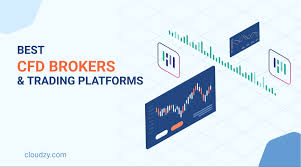
Top Strategies for Navigating the Best CFD Trading Markets
The world of trading is vast and filled with opportunities, especially in the realm of Contracts for Difference (CFDs). As traders seek to leverage their investments, understanding the best CFD trading markets becomes paramount. In this guide, we will explore various markets, useful strategies, and key considerations for successful CFD trading. For an extensive comparison of the leading platforms, visit best cfd trading markets bestbrokercfd.com.
Understanding CFDs and Their Advantages
CFDs, or Contracts for Difference, are financial derivatives that allow traders to speculate on the price movement of underlying assets without owning them directly. This trading method offers numerous advantages:
- Leverage: Traders can control larger positions with a relatively small amount of capital, magnifying potential profits.
- Diverse Markets: CFDs are available on various assets, including stocks, forex, commodities, and cryptocurrencies.
- Short Selling: CFDs allow traders to profit from falling markets by short selling.
- Quick Execution: Online trading platforms facilitate fast execution of trades.
Key Characteristics of the Best CFD Trading Markets
When evaluating the best CFD trading markets, several characteristics come into play. Here are some of the key factors to consider:
- Market Liquidity: High liquidity ensures that traders can enter and exit positions easily, which is crucial for managing risk.
- Volatility: Volatile markets can offer significant trading opportunities, but they also come with risks.
- Transparency: The best markets provide transparent pricing and fair execution, which enhances traders’ trust in their brokers.
- Regulation: Ensure that you are trading in markets regulated by recognized authorities, as this protects your funds and ensures fair practices.
Top CFD Trading Markets to Explore
Here are some of the best CFD trading markets with substantial potential for traders:
1. Stock CFDs
Stock CFDs allow traders to speculate on the price movements of shares from major companies without owning the actual stocks. The stock market is particularly appealing because of the vast amount of information available, making it easier to make informed decisions. Major exchanges, such as the NYSE and NASDAQ, offer a plethora of options, including tech giants like Apple, Amazon, and Google.

2. Forex CFDs
The foreign exchange market (Forex) is the largest financial market globally and offers a diverse range of currency pairs. Forex CFDs are attractive due to their high liquidity and the ability to trade 24 hours a day. Traders can analyze macroeconomic indicators, geopolitical events, and central bank policies to predict currency movements, making it a dynamic trading environment.
3. Commodity CFDs
Commodity CFDs allow traders to gain exposure to physical goods such as gold, oil, and agricultural products. These markets are influenced by supply and demand dynamics, geopolitical tensions, and environmental factors. Trading commodities can provide a hedge against inflation and diversify an investment portfolio due to their often inverse correlation with stock markets.
4. Cryptocurrency CFDs
With the rise of digital currencies, cryptocurrency CFDs have gained significant popularity. They allow traders to speculate on price movements of cryptocurrencies like Bitcoin, Ethereum, and Litecoin without needing to own the actual coins. The cryptocurrency market is known for its extreme volatility, which can lead to high returns, but also significant risks.
Strategies for Success in CFD Trading
To maximize your trading potential in the best CFD trading markets, consider employing the following strategies:
- Risk Management: Setting stop-loss orders and taking profits are crucial in managing risk. Ensure that you only risk a small percentage of your trading capital on each trade.
- Technical Analysis: Use charts, indicators, and patterns to analyze price movements. Understanding support and resistance levels can help identify optimal entry and exit points.
- Stay Informed: Keep up-to-date with economic news, earnings reports, and geopolitical events that can impact markets. Information is key in making sound trading decisions.
- Diversification: Don’t put all your eggs in one basket. Diversifying your portfolio across different asset classes can reduce risks.
Choosing the Right CFD Broker
Selecting a reliable and reputable CFD broker is essential for success in CFD trading. Here are some factors to evaluate:
- Regulation: Verify that the broker is regulated by a recognized authority in your region.
- Trading Platform: The broker should offer a user-friendly and efficient trading platform with advanced tools and features.
- Spreads and Fees: Compare the spreads and commissions charged by different brokers to ensure you’re getting a fair deal.
- Customer Support: A responsive and helpful customer support team is vital for resolving any issues that may arise.
Conclusion
In conclusion, the best CFD trading markets offer tremendous opportunities for traders willing to learn and adapt. By understanding the various markets, employing sound trading strategies, and selecting the right broker, you can enhance your trading experience and potentially achieve your financial goals. Always remember to trade responsibly and to continually educate yourself on market trends and trading techniques.